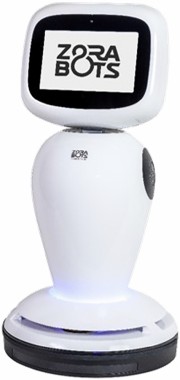[Other] Socially Assistive Robots in Aged Care: Expectations of Older Adults with MCI in Assisted Living Facilities and Their Caregivers - International Journal of Social Robotics
Abstract: In the context of recent demographic changes and related societal challenges, socially assistive robots (SARs) are considered having the potential to support independence and care of older adults. However, little is known about the preferred SAR-features of older adults with mild cognitive impairment (MCI) residing in assisted living and their caregivers. Semi-structured interviews were conducted with two stakeholder groups: older adults with MCI and their (in)formal caregivers. Inductive thematic analysis was used to analyse the data. Forty individual semi-structured interviews were conducted with older adults with MCI (N = 30) and (in)formal caregivers (N = 10). Data revealed seven common role-expectations regarding SARs for both the older adults and caregivers: (1) companion, (2) health assistant, (3) household assistant, (4) physical assistant, (5) cognitive assistant, (6) coach, (7) leisure buddy. One additional, eighth role was identified for the caregivers, i.e. job assistant. The results of this study provide a better knowledge of the features to consider during the development process of SARs in order to maximize the perceived usefulness and hence the intention to use and actual adoption. Additionally, a feasibility analysis showed which features should have the primary focus during the further software development of an existing SAR called James® within the ReMIND-project.
Lay summary (by Claude 3): As robots become more integrated into our daily lives, the question of whether we can form meaningful relationships with them is gaining importance. While there has been research on human-robot relationships, this article takes a deeper look at whether these relationships are being examined thoroughly enough, especially in terms of key ethical concepts like autonomy, agency, and responsibility.
The article challenges the traditional view that properties like consciousness, sentience, and intelligence are exclusively human traits. It argues these properties should be viewed in the context of bodies, actions, and relationships with both human and non-human entities like animals and technology.
The article proposes an “eco-relational” approach that considers our relationality and connections with non-human entities from the start when examining core ethical concepts. It critiques two dominant approaches in robot ethics - the “properties approach” focused on defining properties, and modestly relational approaches.
Using examples analyzed through a phenomenological lens, the article demonstrates how our properties and actions are inherently intertwined with non-human entities like robots. It shows how robots play a central role in shaping our properties and actions, leading to ideas like “hybrid actions” and “non-human agency.”
Ultimately, the article argues that technology and our relationships with it disrupt traditional ethical frameworks. An eco-relational view is needed that accounts for the roles and impacts of non-human entities from the outset when considering key ethical concepts.

Add comment